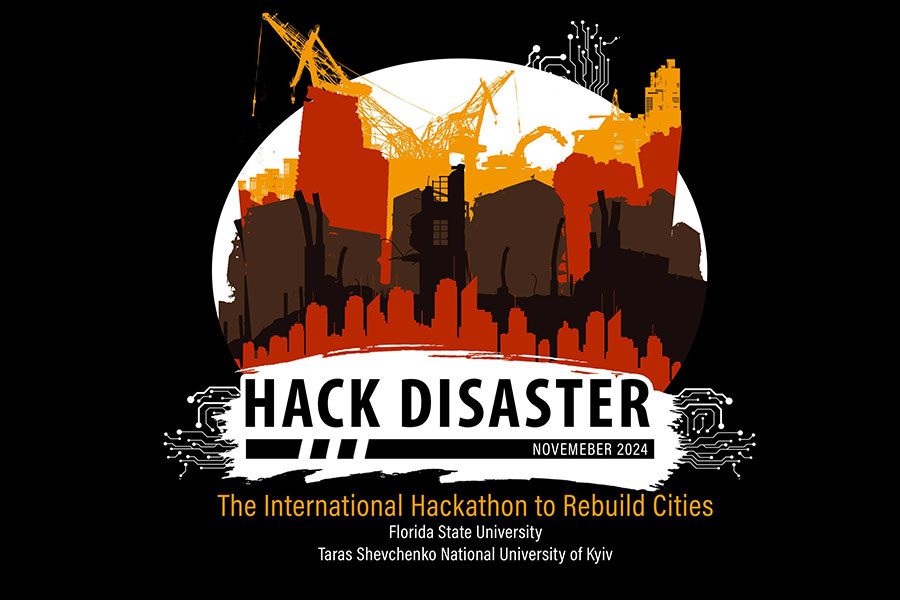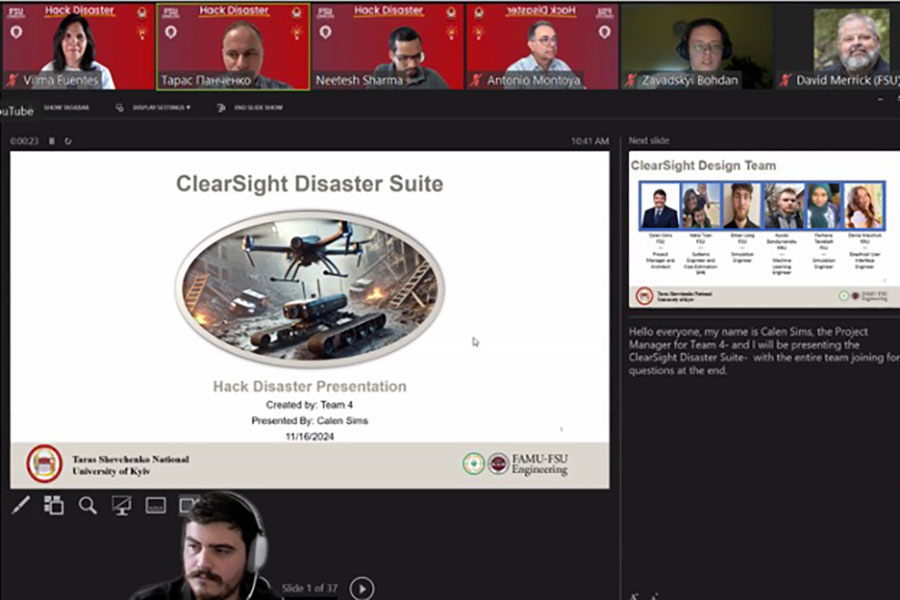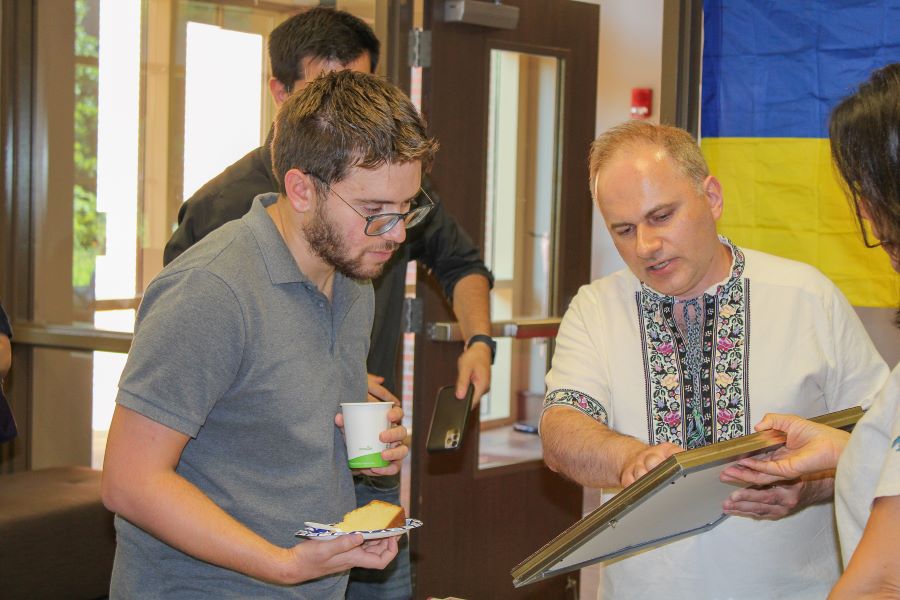
With both Ukraine and Florida experiencing catastrophic damage to cities from war and hurricanes, respectively, students at Florida State University joined forces with peers in Ukraine to develop real-life solutions for reconstruction efforts last month. This collaboration brought students together to address an urgent and tragic crisis – the destruction of cities.
The event, “Hack Disaster: The International Hackathon to Rebuild Cities,” was hosted by the FSU Innovation Hub in collaboration with FSU’s Ukraine Task Force and the Ukrainian-based organization Hackathon Expert Group. The five-day event virtually connected 32 FSU students with 17 students from Taras Shevchenko National University of Kyiv (KNU) in Ukraine.
Hackathons have become a popular educational tool where interdisciplinary teams compete to solve a real-world problem. This unique hackathon split students into nine interdisciplinary teams, each consisting of four to six students from both Ukraine and the U.S. These binational teams worked together online to respond to the rise of natural and manmade disasters in the 21st century.
The challenge provided an exceptional opportunity for students to use design thinking and advanced technology to assess building damage and estimate reconstruction costs. Over a dozen faculty and experts from FSU and KNU volunteered to support the student teams as mentors and facilitators, offering their expertise across several disciplines, including data science, computer science, artificial intelligence, engineering, emergency management, entrepreneurship and communications.
“It was a true partnership from the earliest planning to the emotional conclusion,” said Ken Baldauf, director of the Innovation Hub at FSU. “We blended design methodologies from the FSU Innovation Hub with a hackathon framework from the Ukrainian Hackathon Expert Group. The results were even more impressive and impactful than we had hoped for. Perhaps the most valuable results were the international connections that were formed between all involved.”

The winning team, “Clear Sight Disaster Suite,” included FSU students Calen Sims, Kathleen Ticer, Ethan Long, and Farhana Taiyebah, along with KNU students Kyrylo Bonduryansky and Daniia Kravchuk. Their project focused on using a shipping container as a command-and-control center outside of a disaster recovery zone and establishing a graphical user interface concept.
Sims, the winning team’s project manager and architect, described the event as a “transformative experience.” He earned his undergraduate degree in computer engineering from the FAMU-FSU College of Engineering while at FSU Panama City in 2021 and is currently pursuing a master’s degree in systems engineering at the same location.
“The event not only challenged my technical skills, but also expanded my understanding of project management, systems engineering, interdisciplinary problem-solving and the importance of global collaboration,” he said. “Working alongside talented peers at FSU and KNU was particularly inspiring, as it highlighted the value of diverse perspectives in addressing complex issues like disaster recovery. This experience instilled in me a commitment to leveraging my skills to solve real-world challenges, leaving a lasting impression that will continue to guide my academic and career aspirations.”
The idea for the event was born this past summer when Taras Panchenko, head of the computer science department at KNU, spent a month on FSU’s campus through the BridgeUSA Ukrainian Academic Fellows Program. The program aims to help Ukrainian universities educate and train professionals critical to the country’s recovery and reconstruction through lasting, productive collaboration with U.S. institutions of higher education.

FSU’s Ukraine Task Force hosted Panchenko and three other Ukrainian higher education officials to learn about teacher-training development, combating human trafficking, mental health care, trauma resiliency, intensive English language development, drone applications, closed-circuit television (CCTV), body security innovations and many other areas. The task force was created in 2022 to support Ukrainian colleges and universities, explore areas of possible research or grant collaboration and educate the FSU community about Ukraine. It falls under the purview of the Learning Systems Institute.
During his time on FSU’s campus, Panchenko, who leads the Ukraine-based Hackathon Expert Group alongside peers at KNU, connected with FSU faculty members and discussed how to foster collaborations between students at FSU and KNU. That’s when he pitched the idea for a virtual hackathon where students at both institutions could collaborate virtually to solve a problem.
“All of the BridgeUSA Fellows are spectacular educators,” said Vilma Fuentes, program director of the FSU Ukraine Task Force. “They live in the world of innovation and are trying to find engaging learning opportunities for their students in the midst of Russia’s daily missile and drone attacks. I am delighted to know that we were able to organize this international hackathon just months after Taras Panchenko’s departure. It was a spectacular learning opportunity for all involved. This is just one of the many international projects we hope to implement with our Ukrainian colleagues at KNU.”
In addition to Panchenko, Baldauf and Fuentes, the planning committee for the event included Anna Romanova, researcher at Learning Systems Institute; Gordon Erlebacher, professor in the Department of Scientific Computing and program director of the Interdisciplinary Data Science Program at FSU; Emily Pritchard, assistant provost for health innovation; David Merrick, director of the Emergency Management and Homeland Security Program and the Center for Disaster Risk Policy at FSU; Stephen McDowell, assistant provost for international initiatives at FSU; and Paul Marty, associate vice provost for academic innovation and professor in FSU’s School of Information.
To learn more about the Innovation Hub at FSU, visit innovation.fsu.edu. For more information about FSU’s Ukraine Task Force, visit lsi.fsu.edu/fsu-ukraine-task-force.



